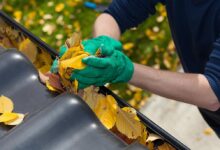
5 Tips to Protect Your Home from Water Damage
- 1 - Assess your roof
- 2 - Maintain your gutters
- 3 - Check pipes
- 4 - Protect your Plumbing & Heating
- 5 - Protect your basement and foundation
Experiencing water damage can be such a hassle.
Not only will you have to deal with the repairs, but you’ll also have to deal with replacing your ruined items and furniture.
Water damage is the most common problem that many homeowners face, and together they cost renters and homeowners billions in accumulative damage every year.
So, protecting your home from water damage should be included in your priority list.
Water damage happens when water pools in places where they normally shouldn’t be. It may happen inside the walls of your house, within the roof, or inside a room.
The most common reasons water damage happens is either from a storm or severe flooding, burst or leaky pipes, cracks in the walls or foundation, roof damage, issues with drainage in your property, or sometimes it could be from a malfunctioning HVAC system.
Here are a few ways you can protect your home from water damage:
1 – Assess your roof
The roof is one part of the house that’s continuously exposed to the elements. Therefore, they incur the most damage compared to any part of the house.
Leaks are common in the roof, and they sometimes go unnoticed for quite a while until watermarks are visible from the inside.
Stay ahead of any problems by regularly inspecting your roof for any signs of damage. Check that there are no missing shingles or cracks.
2 – Maintain your gutters
Water runoff coming from the roof is drained into gutters. But a blocked or damaged gutter can cause water to spill over into the exterior walls and even into windows, which then leads to cracks or paint damage. Make sure you clean your gutters from debris that could block its drainage.
Leaves most often are the most common culprit of blocked drainage, but in some instances, bird nests can also be the reason.
As a rule of thumb, you should clean and maintain your gutters at least twice a year, or before and after a big storm.
3 – Check pipes
It is always a good idea to inspect the pipe system in your home at least once a year. Don’t wait for leaks to happen before taking action.
Stay ahead of the issue by being proactive. Check for signs of corrosion, decay, or rust which always results in either a leak or a pipe bursting.
If you live in cold areas, consider having a pressure release valve installed. With this, you will be able to release the pressure that results from pipes freezing over immediately.
Related Reading: How to Protect your House against Flooding
4 – Protect your Plumbing & Heating
Flooding can cause extensive damage, especially on your appliances. HVAC equipment, heating, and plumbing are very important systems in our homes to keep it functioning, not to mention repairs on these from water damage are quite costly. Consider placing HVAC systems within concrete walls.
Electrical components should be raised at least 50 centimeters above the floor.
Washers and driers are commonly located in the basement where flooding frequently occurs. To keep them from coming in contact with water, place them on cinder blocks to elevate them off the floor.
5 – Protect your basement and foundation
In making sure your basement is dry and protected from flooding, the ground should be sloping away from the foundation of the house by at least 15 centimeters. You can also have a sump pump installed to remove groundwater that may seep inside.
If water does get into your basement, leave about 3 centimeters of gap between the drywall and the basement floor to prevent moisture from eating the wallboard and causing mold to thrive.
About the author: Jason Brooks is a passionate blogger who loves to share tips on home improvement, home renovation, and restoration. She is currently working with Local Heating & Plumbing, one of the most professional, reliable and fully accredited companies, which offers comprehensive and expert Plumbing and Heating Installations in and around Kilburn.






